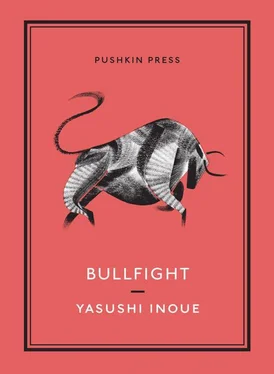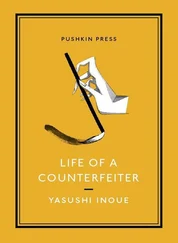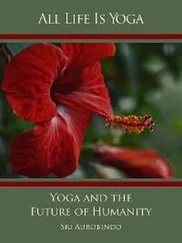It was true — she had. The instant he had asked her that question, she had decided, reflexively, to let the struggle between the two bulls that was playing itself out even now in the middle of the ring decide the issue that had been causing her such agony for so long: whether to break up with Tsugami, or to stay with him. If the red bull won, she would leave him.
She looked out across the stadium. In the ring, two bulls, one red and one black, stood as still as clay statuettes. Now that the rain had let up, cold winter sunlight streamed down on the ring and the bamboo enclosure, and on the crowds surrounding them. The handlers slapped the bulls’ buttocks and flanks to rile them up. The banners flapped in the wind; as the match continued to stagnate, the speakers kept repeating the same phrases time after time, spewing out scraps of speech that sounded weary and annoyed, almost shrieking. The stands were eerily quiet. There was no laughter, no conversation; the spectators were all staring down at the ring. Sakiko felt something dark and cold and slow, like twilight, filling the stadium, and it hit her in the chest with a feeling of sadness that was almost more than she could bear.
And then it was over. The quiet shattered as the whole stadium leaped to its feet, cheering. Down in the ring, the balance between the two bulls had finally crumbled, and the raging, pumped-up winner was running around and around the ring, unable to contain the excitement of his victory. Sakiko could not tell at first which of the bulls had won. She felt terribly dizzy. Restraining the urge to reach out and grab Tsugami’s shoulder, she kept her eyes on the ring. All she could see was the strange circling of that sorry red beast, stirring and stirring with its bulk the muck of helpless sorrows filling the vast horseshoe of the stadium.
I began my career as a novelist in 1949, the year I published The Hunting Gun . My next work, Bullfight , earned me the Akutagawa Prize, and with that I became a true writer. When I reread these two texts now, whatever qualities and defects they may have as literature, I find myself dazzled by the beginner’s enthusiasm that animated me in those days.
I was forty-two when The Hunting Gun and Bullfight were published. In the span of a man’s life this is already verging on old age, but within the context of my life as a writer there is no question that this was my adolescence, and these the works of a very green novelist.
They say that, as authors mature, they follow the trajectory charted by their first writings — a rule to which, it seems, there are no exceptions. If this is correct, then The Hunting Gun and Bullfight carry within them, alongside their youthful ungainliness, something fundamental from which I have never been able to break free. For this reason, I believe I am more fully present in their pages than in any of my other texts.
Forty years have flowed by since then without my seeing them go, fifty novels of varying length, a hundred and eighty novellas… When I consider the work I have done, I feel a little like I am gazing out at a garden gone to seed. Amaryllises poking up in random places, roses whose appearance leaves much to be desired. The flowers blooming there belong to the most diverse species, large and small, transplanted from the desert and the Himalayas. Weeds are encroaching everywhere. Yes, it is an untended garden. Each time I look upon this landscape, it seems somewhat different. Sometimes, when the sun is shining, I find it filled with clarity. Other days it is sunk in shadow, hushed and gloomy. No matter how it appears to me, though, this untamed garden is me. No one else but me, all there is to me.
Just as men are born under lucky or unlucky stars, so, too, literary works are more or less blessed by fortune. Some arrive in the world perfectly formed; others are born sickly. Certain works achieve celebrity, while others languish in the shadows, condemned to huddle all their lives in an out-of-the-way corner. Whether or not a work meets with success is to some extent a matter of caprice. Works the author approves of are ignored, and vice versa. The destinies of literary works are as fickle as those of men. Among the works I have published, some have had the good fortune to be much discussed, while others were forgotten almost as soon as they saw the light of day.
An author’s attachment to his works is not necessarily proportional to their success. On the contrary, he is overwhelmed by the desire to usher into the world works that he has been unable to complete, that remain unfinished. One notices this, naturally, in collections whose contents he himself has selected. This may well be their principal interest.
Some years ago, I put together a collection containing twenty-three texts: The Hunting Gun and Bullfight , which launched my career as a writer, and other novellas among the many I had written over the years with which I was particularly pleased. Had critics or readers been in charge of the selection, I have no doubt that the results would have been different.
YASUSHI INOUE
Tokyo, 1988
Originally published as the preface to the 1988 edition of
Bullfight ( Combat de taureaux )
published by Editions Stock












